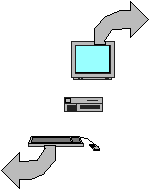The Program and the User
Ross Rhodes
 Free will is a recurring dilemma for those contemplating a universe created by
computer simulation. Over and over again, they try to imagine consciousness emerging from the
algorithm. Logically, they conclude, the consciousness must arise from the algorithm because the
algorithm constitutes the universe, of which consciousness is a part. But how can the algorithm be
aware of itself? How can any amount of complexity lead to the objective step-back-and-
contemplate-the-whole? These are deep questions. Free will is a recurring dilemma for those contemplating a universe created by
computer simulation. Over and over again, they try to imagine consciousness emerging from the
algorithm. Logically, they conclude, the consciousness must arise from the algorithm because the
algorithm constitutes the universe, of which consciousness is a part. But how can the algorithm be
aware of itself? How can any amount of complexity lead to the objective step-back-and-
contemplate-the-whole? These are deep questions.
It seems to me that these computer philosophers are missing something very basic. What,
after all, is the purpose of computer program? Is it not to convey information to a user?
Let us imagine a standard desktop PC running without a user interface. Perfectly self
contained. Its algorithms happily compute endlessly. We have turned on the power and instructed
the computer to run the program. It does so. However, we have also removed the keyboard,
mouse, monitor and speakers. How is one to distinguish such a machine from a stone?
Just as it seems to me that a computer program implies a programmer, it also seems to
me that a computer program implies a user. Given the fact that we humans experience the
programming, it does not seem to be a great reach to infer that we are the users for whom the
simulation has been created.
If we accept that hypothesis, there is no need to wonder how consciousness can arise from
programming. It does not. It exists independently, and it experiences the programming. Without
the user, the programming would be quite pointless. And we cannot assume that the programming
is pointless, because Somebody went to a great deal of trouble to create it.
Canton, Ohio
October 17, 2000
|